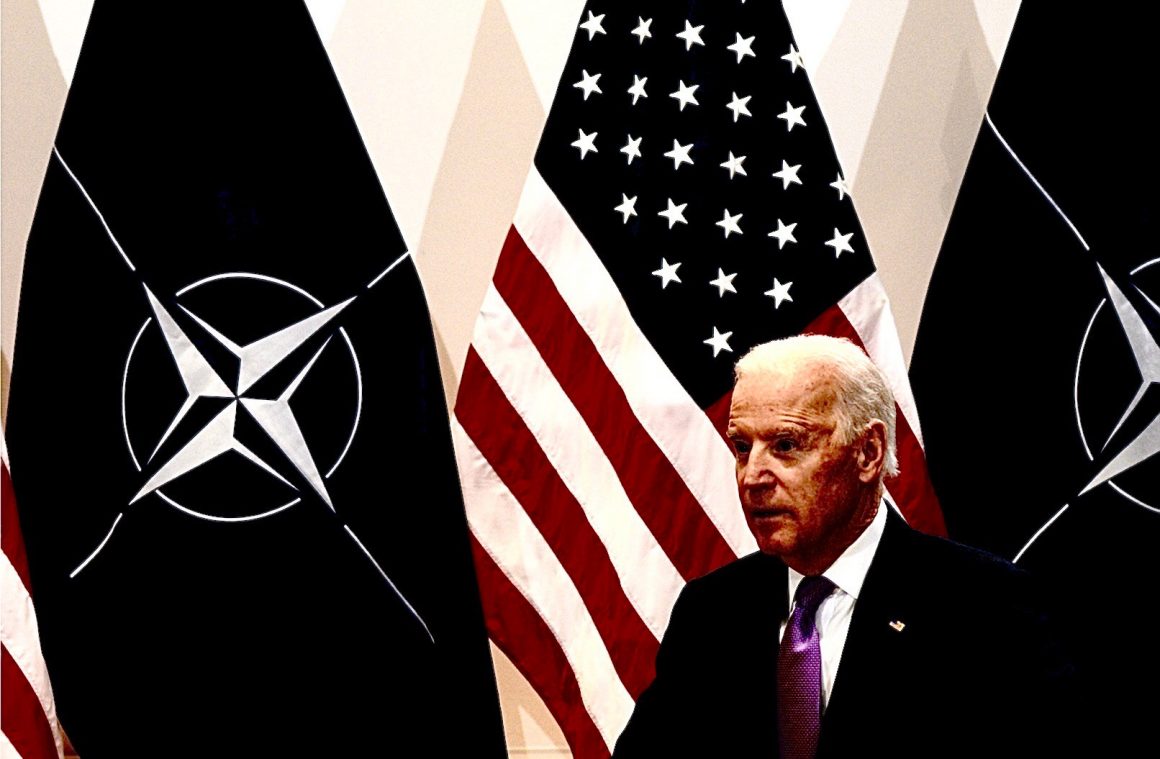It was December of 2016, and the leaders of U.S. imperialism’s technocratic wing were frantic. They desperately needed to defend an idea, the idea that America’s bourgeois republic is worth preserving. This all-important idea, the one that holds the imperial project together, had just come under unexpected threat. The dysfunction and decay of the system, shown by how the people still hadn’t truly recovered from the 2008 crisis, produced shocking consequences in the form of Donald Trump’s election. This event confirmed to the ruling class that their social and political order was in a process of decline. That the U.S. empire was following in Rome’s path of letting corruption and excess slowly corrode it, until it got destroyed by one of the unhinged leaders the collapse produced.
Within military intelligence circles, sentiments to this effect were being passed around. Shortly prior to Trump’s inauguration, the Pentagon put out a report which said that America’s global influence was fast disappearing, following this with recommendations to prepare civic society for some coming era of instability. The report’s statements about a need for greater militarization and surveillance were predicated on the fear that the state would lose the propaganda war. It warned how there’s come to be a “hyper-connectivity and weaponization of information, disinformation, and disaffection,” meaning that “In the end, senior defense leaders should assume that all defense-related activity from minor tactical movements to major military operations would occur completely in the open from this point forward.”
This was an extension of a broader fear of losing control over popular consciousness which had overcome the ruling class. The consensus was that without a way to respond to how social media had made it possible to expose facts which discredit the all-important idea, the imperial project would become untenable. The FBI’s report on the output from RT made it clear that the concern was not only about the exposure of what the state considers “misinformation.” It was also about things that are patently true or impossible to seriously argue against, yet the state prefers not to be talked about. Things like the control that big money has over our electoral system, human rights abuses by police, and economic inequality. It’s this type of information that the Department of Homeland Security considers “mal-information,” where factual material gets presented in ways the state claims is for malicious purposes.
The liberal apparatus’s initial response to this new threat of the public becoming over-informed was to create the Global Engagement Center, formed by Obama’s signing of the Countering Foreign Propaganda and Disinformation Act in December of 2016. The government wouldn’t have been able to pass this bill without the concoction of Russiagate, the central narrative used to justify liberalism’s war against democratic freedoms during recent years. Russiagate’s foundations had begun to be constructed in July of 2016, when the DNC leaks proved that a counter-narrative would be necessary for fighting ideas that endanger imperialism’s cultural hegemony. By showing how DNC officials had worked to help ensure the billionaire-funded neocon candidate won the primary, WikiLeaks sent liberalism into crisis mode, even more than it had already done.
To maintain the illusion of a system that represents the people, the oligarchy and its intelligence strategists needed an argument to defend the system, even if that argument didn’t refute anything WikiLeaks and the other anti-imperialist sources were reporting. The argument they came up with was that all facts which reveal the system’s evils are by definition mal-information, because these facts are being shown to the American people by foreign propagandists. Propagandists who seek to destroy what the ruling class narrative managers would keep referring to as “our democratic institutions,” even though the notion of America being a genuine democracy had just been effectively disproven.
When Trump got into office, and the empire entered into a crisis that the liberal class had come to believe was unprecedented, it was this argument that the liberals could use to ensure the empire’s survival. By continuously assailing Trump with the accusation that his campaign had colluded with Putin to give WikiLeaks the DNC emails, they made their forensically dubious story about a “Russian hack” into a means for leveraging the unpredictable new administration to continue the new cold war. They successfully pressured Trump into being an even more antagonistic president towards Russia than Obama had been, bombing Syria, expanding the sanctions on Russia, facilitating NATO expansion, and ending the agreements which had held back a new U.S.-Russia nuclear arms race. The war machine was maintained during the years the liberals were waiting to get back into the White House. And to keep the war machine functional, the liberals acted to strengthen their information policing system.
The goal was to prevent the myth of “humanitarian interventionism” which had successfully placated the antiwar movement during the Obama years from getting shattered. During the first months of the Trump administration, this goal felt within reach. The Democrats, and the neocons they’d come to solidly align with, adopted the practice of implicitly praising Trump whenever he advanced their foreign policy goals. MSNBC’s Brian Williams reacted to Trump’s April 2017 Syria strike by saying the bombs were “beautiful pictures of fearsome armaments.” But when this brazen endorsement of war got MSNBC backlash—which was by extension backlash against the Democratic Party, since MSNBC is one of the party’s propaganda wings—the available narrative management tactics became more limited.
The liberal pro-imperialists, and their social democratic wing in orgs like the DSA, found the best way to defend imperialism’s narratives was to attack those who exposed pro-war psyops. Anybody who pointed out the inconsistencies in the account supposedly showing Assad had committed a chemical attack got targeted by the imperialism-compatible left, whose job is to police what it means to be on the “left” and is therefore a useful ally to the neocons.
The narrative managers had found the basis for the rhetoric they’d employ during this new era of political uncertainty. Their protocol was to attack anti-imperialists as Russian bots or assets, and to act like support for Russia in today’s geopolitical conflict is necessarily a right-wing phenomenon. Within the Democratic Party and left anti-communist circles, these tactics were effective at stopping minds from getting won over to the anti-imperialist stance. But the reality they would have to confront was that outside these insular spaces, there continued to be growing potential for anti-imperialist consciousness to rise.
—————————
2017 was seen by Bill Maher as a retread of 2016, where the Democratic Party’s neoliberal leadership went through the same conflict with left insurgents that it had experienced the previous year. Yet a new development was emerging within the left’s own ideological conflict: those who cared about anti-imperialism were noticing that Bernie Sanders wasn’t challenging the new cold war’s narratives. He was reinforcing all of them, and using their supposed correctness as the basis for his argument that his supporters needed to unify behind the DNC. He was getting deradicalized, to the extent that he was ever a radical in the first place, and the Sanders voters who remained loyal to his brand were regressing along with him. But the element of his movement that had revolutionary potential, the one which had gravitated toward the Free Assange movement, were learning that Sanders had never truly represented their goals.
The Hillary Clinton psyop had worked, insofar as it had kept the left flank of the American electorate from mostly becoming disillusioned with the myth that our political system is fundamentally worth preserving. Sanders was the main one responsible for this psyop’s success. He had corralled many of his supporters into his opportunistic reformist project through the notion that our bourgeois “democracy” simply needs to be fixed, rather than overthrown. The areas where the psyop didn’t succeed could be found within the country’s rising anti-imperialist struggle, which includes the Free Assange movement. For Maher’s purposes, this continued growth of anti-imperialist consciousness was unacceptable. So he and the political forces he represents escalated their attacks against anti-imperialism.
The only reason Maher was willing to support Sanders was because Sanders, as an individual, would never seriously challenge the Democratic Party. Maher showed this when he pointedly declared after the California primary that Clinton had won “fair and square,” despite the evidence of vast electoral corruption. Sanders wasn’t going to refuse to endorse Clinton or dispute the lies behind Democrat foreign policy, therefore actors like Maher never saw him as a threat. The threat only existed within the element of the Sanders movement that had revolutionary potential, which was substantial enough for the Democratic Party to have an incentive for targeting it with fury.
After these partisan actors denounced this element of the movement as “spoilers” who were to blame for Trump’s election, they shifted towards attacking this element for its anti-imperialist stance. Beyond the direct denunciations of what they called “Assad apologists” and “Putin apologists,” this offensive consisted of increasingly severe censorship against anti-imperialist sources, combined with aggressive affirmations of the pro-war psyops. As the intelligence community pressured social media companies into enacting unprecedented online censorship, actors such as the disgraced anchor Keith Olberman said things like “we were invaded” in reference to Russia’s supposed interference. Maher at one point essentially summarized the narrative purpose behind Russiagate by saying: “It all adds up…Watergate was follow the money, this case is roll the video tape. And it all points to a Russian plot to degrade our faith in democracy, install a puppet state and fuck over an old enemy.” The idea these actors sought to convince us of was that the left’s primary enemy should be the Russians, and that implicitly the left needs to help defend the imperial republic from Russia’s alleged subversion.
The reasons why these efforts to solidify the public’s allegiance towards neoconservatism failed are that much of the left isn’t compatible with the neocon stance; and that there are many who aren’t on the left, yet are still compatible with the anti-imperialist movement. These enemies of neoconservatism were there to counter the next big psyop, which was that Assad had carried out a chemical attack in Douma. Beyond the initially obvious flaws in the official story, over time more evidence debunking the narrative came out, and these anti-imperialists were ready to amplify the publication of this evidence. The definitive event was when WikiLeaks revealed in late 2019 that the Organization for the Prohibition of Chemical Weapons had suppressed forensic accounts which went against the preferred narrative.
Despite how advanced the censorship paradigm had become by then, WikiLeaks was able to turn this into a serious problem for the Syria psyop, enough that the narrative managers had to try to refute it. This was because WikiLeaks had gained a big enough platform prior to the censorship campaign for WikiLeaks to still have that kind of impact. (Take note of this detail for later!)
Another development that disrupted the psyops was the publication of the Mueller report in spring of 2019. This report exposed the discrepancy between what liberals had come to believe, and what reality was. They’d genuinely convinced themselves that Russiagate was real, so when their own intelligence asset couldn’t find collusion, they were unprepared. The damage was so bad that the narrative managers had to change which ideological strain to primarily target. They decided to temporarily shift towards China as the main country they vilified, starting with the glorification of that year’s CIA-backed Hong Kong protests. This meant that the ideologically broad category of anti-DNC leftists were no longer the biggest domestic targets of imperialist propaganda’s McCarthyist component. Now the main targets were the pro-China Marxists, and the actors like Max Blumenthal who aren’t necessarily Marxists but who still fight the Xinjiang psyop.
In this new landscape, the main arbiters of the attacks against anti-imperialists were no longer Russiagate demagogues like Maher, but rather online influencers. These actors work within the same propaganda mediums where modern Marxists operate, namely the blogosphere, social media, and streaming. The idea they put forth is that the left’s primary goal should be to combat the Marxists who support existing socialism. Which, because those Marxists tend to also support Russia in its efforts at weakening U.S. hegemony, has since developed into what the campaign against anti-imperialists now is.
—————————
So far during the social media age, direct repression and censorship haven’t been the primary tools for fighting anti-imperialists. The main tool has been discourse, where imperialism’s agents work to discredit those who hold the revolutionary stance in the eyes of the average social media user. Their goal is to gatekeep who’s viewed as worthy of respect within the left, canceling anybody who challenges the beliefs the three-letter agencies seek to propagate.
As the elites try to keep control over the discourse going into the 2024 election—which they clearly overall hope the Democrats win, given that Trump just got indicted—they’re intensifying this discourse element of their information warfare. They’ve introduced a domestic version of NAFO, in the form of a project for shaping social media rhetoric throughout the presidential campaign (and no doubt beyond then). The problem they’ve encountered is that class conflict is still escalating. Which gives them cause to fully utilize the system for political repression that they expanded after Covid and January 6th. Online discourse manipulation, and its real-life counterpart COINTELPRO, are failing to stop the rise in worker mobilization or the emergence of an anti-NATO movement. The conditions are reaching a point where it becomes necessary to make repression the primary counterinsurgency tool.
Amid both January 6th and Covid, the liberals continued the practice established by Russiagate of using ruling class infighting to build their tools for suppressing imperialism’s enemies. When the pandemic started, it provided an opportunity to expand the information control mechanisms, an action that the three-letter agencies were already trying to create a narrative pretext for. As the 2020 election cycle started, we again began hearing about a threat of foreign interference, this time not just from the Russians but from the Chinese and the Iranians as well. The pandemic was what compelled the Trump administration to assist the intelligence agencies in strengthening their coordination with the tech companies, with the goal being to police what these agencies considered Covid disinformation.
This was an important part of the project to construct a narrative policing apparatus, because the measures that had initially been undertaken throughout the project were (and still are) not working well enough. Last year the Global Engagement Center was given a failing grade on its effectiveness by a State Department watchdog. It was shown to be unable to gain the authority or tactical nimbleness required for sufficiently suppressing the anti-imperialist movement. That hasty experiment from the last weeks of Obama’s term has failed. Over the years that have made up this project, the narrative managers have needed to innovate, intermittently creating new information war task force teams and then replacing those teams with tweaked versions.
During the 2020 election, when the Democrat/neocon alliance was trying to return things to the more competent imperialism of the Obama era, these operatives were tasked with something important: suppressing knowledge of the Biden family’s corrupt connections within Ukraine. And they succeeded at this, enough for the scandal not to be fatal to the Biden campaign. The Intercept has described how the mechanisms for information policing which were used in this task had been expanded by that year’s government campaign to guide social media narratives on Covid:
In an appearance on Joe Rogan’s podcast in August, Meta CEO Mark Zuckerberg revealed that Facebook had limited sharing of the New York Post’s reporting after a conversation with the FBI. “The background here is that the FBI came to us — some folks on our team — and was like, ‘Hey, just so you know, you should be on high alert that there was a lot of Russian propaganda in the 2016 election,’” Zuckerberg told Rogan. The FBI told them, Zuckerberg said, that “‘We have it on notice that basically there’s about to be some kind of dump.’” When the Post’s story came out in October 2020, Facebook thought it “fit that pattern” the FBI had told them to look out for…Documents filed in federal court as part of a lawsuit by the attorneys general of Missouri and Louisiana add a layer of new detail to Zuckerberg’s anecdote, revealing that officials leading the push to expand the government’s reach into disinformation also played a quiet role in shaping the decisions of social media giants around the New York Post story.
With January 6th, these mechanisms were used to suppress content of a more clearly anti-imperialist character, content that had nothing to do with the ideological tendency behind the attack. Palestinians were subjected to a great increase in social media censorship following the riot, a development that wasn’t even prompted by pressure from the intelligence agencies but was simply part of the initial reaction these companies had to the crisis. It showed that bias against marginalized groups and the victims of imperialist violence is fundamentally built into our online structures, priming these companies to obey whatever censorship suggestions the DHS would give them following the attack. The wing of the DHS created by the Cybersecurity and Infrastructure Security Agency Act (signed in 2018) has claimed its activities don’t violate the First Amendment. It argues that even though it directly tells these companies about offending material, these companies can decide on their own what they censor. This is nothing but a technicality, as big tech follows the exact same ideology that the three-letter agencies do.
A year ago, when Biden created the Disinformation Governance Board, the goal was to expand this arrangement of mass cognitive policing, finally compensating for the Global Engagement Center’s failures. That the Board was soon defunded after widespread backlash hasn’t stopped the DHS (and the companies that share the ideology of the DHS) from carrying out the Board’s plans. The DHS has been collaborating with operatives responsible for innovations in narrative policing abroad, like UK troll farms that have conducted influence projects within the Ukraine conflict. Last year, PayPal and other transaction services cut off individuals and media outlets that they saw as perpetrators of Russian interference. Biden’s domestic NAFO is potentially the final stage in this discourse-policing aspect of the counterinsurgency, the part where the empire maximizes its online influence operations after it’s reached the constitutional limits of censorship.
What comes next can be found in the RESTRICT Act, whose unprecedented measures for attacking anti-imperialists will no doubt be implemented even if the Act itself doesn’t pass. These measures are about codifying the legal logic the DOJ has used to indict the leaders of the African People’s Socialist Party, who’ve been accused of involvement in a Russian interference plot. To carry out this next step in the counterinsurgency, where the main tactic goes from policing the discourse to repressing anti-imperialists directly, the state will need to successfully create a narrative pretext for these actions. To either revive Russiagate, or replace it with a new McCarthyist psyop, so that American liberalism’s essential myth can be maintained. So that our centers of discourse continue to be dominated by the idea that our ruling institutions are worth saving, even as those institutions are attacking the people’s right to resist war and militarism.
Like was the case during Russiagate, this psyop can only be successful within the parts of our mass psychological space where anti-imperialists haven’t managed to establish their own influence. The anti-imperialists are capable of expanding their range of narrative control, they showed that this year when they gained a countrywide platform with Rage Against the War Machine. With the intensification of class antagonisms that’s come from this war’s economic harm, many more people are becoming ready to come to anti-imperialist consciousness. We must work to give them access to the education required for this. If we’re successful enough in this task, we’ll be able to keep escalating the class conflict, even through this new era of heightened repression.
————————————————————————
If you appreciate my work, I hope you become a one-time or regular donor to my Patreon account. Like most of us, I’m feeling the economic pinch during late-stage capitalism, and I need money to keep fighting for a new system that works for all of us. Go to my Patreon here.








